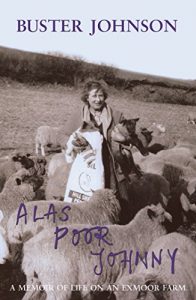In 1951 Buster Johnson moved from Surrey to Exmoor with her husband Johnny, four children, a couple of dogs and a vanload of pigs and poultry. Naturally gregarious, she exchanges a life of domestic servants and bridge parties for a remote and spartan existence at West Nethercote, a farm in the heart of Exmoor national park. Alas Poor Johnny, written some ten years later, is her vivid and fascinating account of their life there, and of farming on Exmoor in the fifties, told with a strong sense of drama and of the absurd.
The void left by her lost cultural and social pursuits becomes filled by the minutiae of everyday life, and by her husband Johnny and their four children. Above all, it is filled by the animals. These take the place of absent friends in her affections, their personalities permeating the book. There is a small but strong supporting cast, including busybody Mrs Stevens at the next door farm; Arthur the ex-cowman who moves with them from Surrey; SRN Tommie, the butt of an aggressive ram – and Alby the rabbit catcher, who plays the mouth organ and dances wild dances, enchanting the children.
Finally, threading through all this with a glint of steel, is Johnny. He is her antithesis; strong and undemonstrative, generally preferring animals to people. Their relationship is the heart of the book.
Alas Poor Johnny is a first-hand account of life on a farm in the 1950s, written at the time but reading with the freshness of the present. It will appeal to anyone, whether interested in Exmoor and old farming practices, a lover of the countryside and of animals, or just wanting to cheer themselves up with a good story, well told. It is a delight to read, hugely funny and, at times, touching.
Buster and Johnny spent the rest of their lives at Nethercote. She died in 1987, without ever publishing her book. Her daughter Birdie, who herself lived there for many years, has now done so on her behalf. Boris Johnson, Buster’s grandson, has written a foreword.
Featured in The Bookseller, March 2015 Non-Fiction picks, Biography & Memoir.
The void left by her lost cultural and social pursuits becomes filled by the minutiae of everyday life, and by her husband Johnny and their four children. Above all, it is filled by the animals. These take the place of absent friends in her affections, their personalities permeating the book. There is a small but strong supporting cast, including busybody Mrs Stevens at the next door farm; Arthur the ex-cowman who moves with them from Surrey; SRN Tommie, the butt of an aggressive ram – and Alby the rabbit catcher, who plays the mouth organ and dances wild dances, enchanting the children.
Finally, threading through all this with a glint of steel, is Johnny. He is her antithesis; strong and undemonstrative, generally preferring animals to people. Their relationship is the heart of the book.
Alas Poor Johnny is a first-hand account of life on a farm in the 1950s, written at the time but reading with the freshness of the present. It will appeal to anyone, whether interested in Exmoor and old farming practices, a lover of the countryside and of animals, or just wanting to cheer themselves up with a good story, well told. It is a delight to read, hugely funny and, at times, touching.
Buster and Johnny spent the rest of their lives at Nethercote. She died in 1987, without ever publishing her book. Her daughter Birdie, who herself lived there for many years, has now done so on her behalf. Boris Johnson, Buster’s grandson, has written a foreword.
Featured in The Bookseller, March 2015 Non-Fiction picks, Biography & Memoir.






